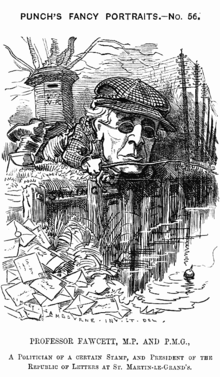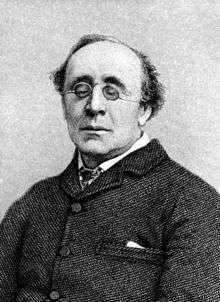Henry Fawcett
Henry Fawcett (26 August 1833 – 6 November 1884) was a British academic, statesman and economist.[1]
Henry Fawcett MP | |
|---|---|
_by_Ford_Madox_Brown.jpg) Henry Fawcett and Millicent Garrett Fawcett by Ford Madox Brown, 1872, National Portrait Gallery, London. | |
| Postmaster General | |
| In office 3 May 1880 – 6 November 1884 | |
| Monarch | Queen Victoria |
| Prime Minister | William Ewart Gladstone |
| Preceded by | Lord John Manners |
| Succeeded by | George Shaw-Lefevre |
| Personal details | |
| Born | 26 August 1833 Salisbury |
| Died | 6 November 1884 (aged 51) |
| Nationality | British |
| Political party | Liberal |
| Spouse(s) | Millicent Garrett (1847–1929) |
| Alma mater | University of Cambridge |
Background and education


Henry Fawcett was born in Salisbury, and educated at King's College School and the University of Cambridge: entering Peterhouse in 1852, he migrated to Trinity Hall the following year, and became a fellow there in 1856, the year he graduated BA as 7th Wrangler.[2]
In 1858, when he was 25, he was blinded in a shooting accident. Despite his blindness, he continued with his studies, especially in economics. He was able to enter Lincoln's Inn, but decided against a career as a barrister and took his name off their books in 1860.[3]
Academic career
Two years later, Henry Fawcett reportedly attended the 1860 Oxford evolution debate, during which he was asked whether he thought Bishop Samuel Wilberforce had actually read the Origin of Species. Reportedly, Henry Fawcett replied loudly, "Oh no, I would swear he has never read a word of it". Ready to recriminate, Wilberforce swung round to him scowling, but stepped back and bit his tongue on noting that the speaker was the blind economist.[4]
At the next meeting (in September 1861) of the British Association in Manchester, Henry Fawcett defended the logic behind Charles Darwin's theories.[5] This significantly affected its acceptance.
In 1863, Henry Fawcett published his Manual of Political Economy and became Professor of Political Economy at Cambridge. He made himself a recognised authority on economics, his works on which include The Economic Position of the British Labourer (1865) and Labour and Wages.
In 1883, he was elected Rector of Glasgow University.
Political career
After repeated defeats as a Liberal Party candidate, Henry Fawcett was elected Member of Parliament for Brighton in 1865. He held this seat until 1874, and thereafter represented Hackney between 1874 and 1884. He campaigned for women's suffrage. In 1880, he was appointed Postmaster-General by William Ewart Gladstone and sworn of the Privy Council.[6]
He had a particular interest in encouraging saving through the Post Office Savings Bank. He introduced the savings stamp which allowed people to save pennies at a time to build up the minimum account limit of a shilling. He pushed through parliament an act to allow savers to convert their post office savings to government stock and he developed the post office's life insurance and annuities schemes.[7] He introduced many other innovations, including parcel post, postal orders, and licensing changes to permit payphones and trunk lines.
Family
Through his campaigning for women's suffrage, Henry Fawcett met Elizabeth Garrett, to whom he proposed in 1865. She rejected the proposal to concentrate on becoming a doctor at a time when female doctors were extremely rare.
However, in 1867 Fawcett married Elizabeth's younger sister Millicent Garrett.[8][9] They had one child, Philippa Fawcett.
Henry Fawcett's career was cut short by his premature death from pleurisy in November 1884, aged 51. He is buried in Trumpington Extension Cemetery, Cambridge where several members of the family of Charles Darwin are also buried, including Sir George Darwin, Lady Maud, and Gwen Raverat.
Legacy
There are statues of him in Salisbury Market Square and in Victoria Embankment Gardens (Henry Fawcett Memorial) near Charing Cross in central London. The latter is by the eminent sculptor Mary Grant. A fine statue with an angel standing over a seated Henry Fawcett (by the sculptor George Tinworth) was erected in 1893 in Vauxhall Park (opened in 1890 on this site of Fawcett's house, The Lawns) but was removed by Lambeth Council in 1959. Alfred Gilbert was commissioned to make a memorial which stands in Westminster Abbey.[10]
Sir Leslie Stephen wrote a biography of him, Life of Henry Fawcett, in 1885. He is listed amongst the important British Reformers on the "Reformers Memorial" in the centre of the eastmost oval section in Kensal Green Cemetery.
Fawcett Primary School in Trumpington, Cambridge, was opened in 1949 and named after Henry Fawcett who lived nearby.[11] There is also a Henry Fawcett primary school in London, which opened in 1937.[12]
Fawcett's time as Postmaster General was fondly remembered by many postal workers, and when London sorting clerks formed a union in 1890, they named it the Fawcett Association.[13]
References
- "Biography of Henry Fawcett". University of Glasgow. Retrieved 1 March 2008.
- "Fawcett, Henry (FWCT852H)". A Cambridge Alumni Database. University of Cambridge.
- Goldman, Lawrence (2003). The Blind Victorian: Henry Fawcett and British Liberalism. Cambridge University Press. p. 94. ISBN 0-521-89274-0.
- Janet Browne, Charles Darwin: The Power of Place, 2003, p. 126.
- London Illustrated News, 16 September 1861, p. 279
- "No. 24841". The London Gazette. 4 May 1880. p. 2836.
- Archibald Grainger Bowie The Romance of the Savings Banks 1898 SW Partridge & Co
- Millicent Garrett Fawcett Archived 10 March 2009 at the Wayback Machine – Spartacus Educational
- The Passing Parade with John Doremus, Evening with Ian Holland, Radio 2CH 20:40 AEST 3 August 2007.
- "Gilbert, Sir Alfred". Oxford Dictionary of National Biography (online ed.). Oxford University Press. doi:10.1093/ref:odnb/33398. (Subscription or UK public library membership required.)
- Fawcett Primary School - About Us "Archived copy". Archived from the original on 4 April 2017. Retrieved 2 April 2017.CS1 maint: archived copy as title (link)
- Henry Fawcett Primary School - History "School website". Retrieved 30 December 2019.
- Marsh, Arthur; Ryan, Victoria (1980). Historical Directory of Trade Unions. 1. Farnborough: Gower. p. 86. ISBN 0566021609.
![]()
External links
| Wikimedia Commons has media related to Henry Fawcett (1833-1884). |
- Works by Henry Fawcett at Project Gutenberg
- Works by or about Henry Fawcett at Internet Archive
- Works by Henry Fawcett at LibriVox (public domain audiobooks)

- Henry Fawcett at Find a Grave for Henry Fawcett
- Hansard 1803–2005: contributions in Parliament by Henry Fawcett
| Parliament of the United Kingdom | ||
|---|---|---|
| Preceded by Henry Moor James White |
Member of Parliament for Brighton 1865–1874 With: James White |
Succeeded by James Lloyd Ashbury Charles Cameron Shute |
| Preceded by John Holms Sir Charles Reed |
Member of Parliament for Hackney 1874–1884 With: John Holms |
Succeeded by James Stuart John Holms |
| Political offices | ||
| Preceded by Lord John Manners |
Postmaster General 1880–1884 |
Succeeded by George Shaw-Lefevre |
| Academic offices | ||
| Preceded by John Bright |
Rector of the University of Glasgow 1883–1884 |
Succeeded by Edmund Law Lushington |